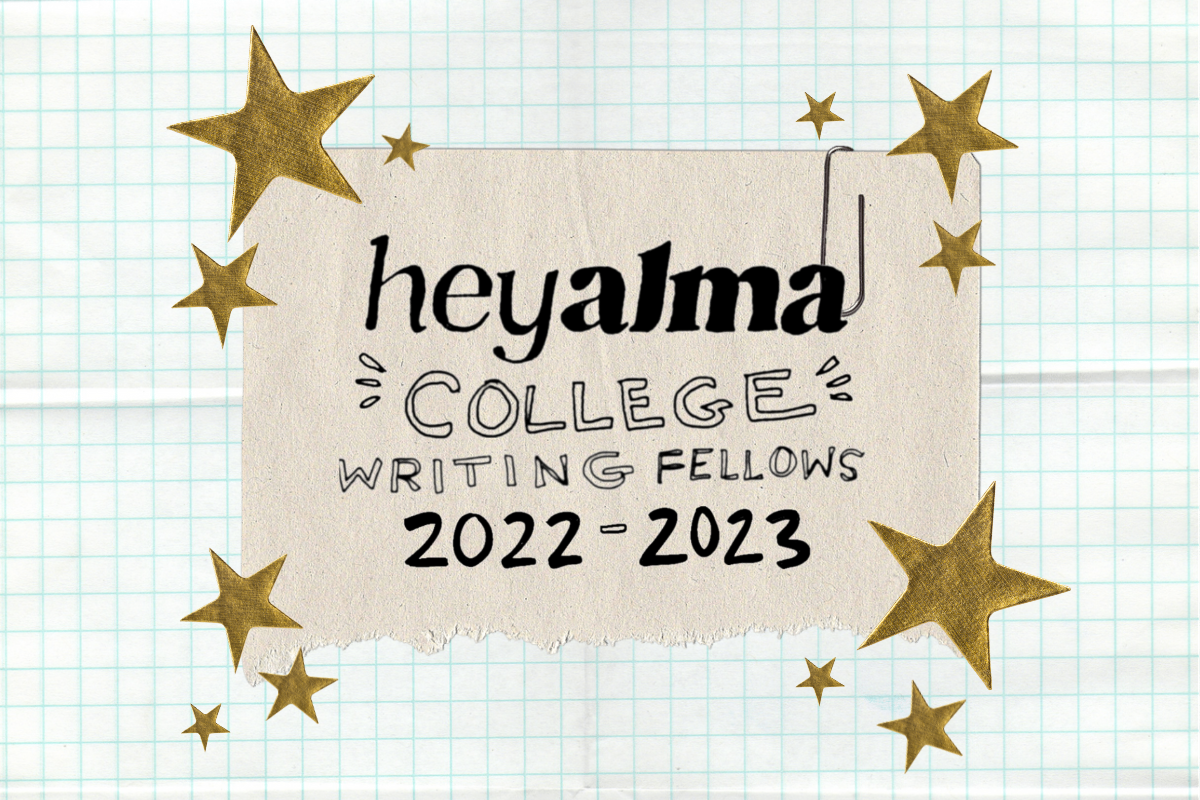In September 2022, we announced the cohort for the third year of the Hey Alma College Writing Fellows program. Over the last year, we’ve met with these 18 wonderful college students to to discuss the ins and outs of digital media. At they same time, they’ve taught the Hey Alma team so much about about Jewish life on campus today and the meaning they find in their own unique Jewishness. As the school year winds down, we simply cannot let their fellowship end without bragging about them and their accomplishments. (We are Jewish, after all.)
Below is one article from each of our fellows who wrote for us this year (picking just one per fellow was truly a feat!). Though they range in subject, from cultural commentary to essays on personal identity, all of these pieces are written with tact, poise and journalistic integrity.
You can click on any name to see the author’s page and all of the fantastic pieces they’ve worked on all year. And if you’ll be in college next year, stay tuned for information on next year’s Hey Alma College Writing Fellows Program.
Sabrina Abselet‘s primer on the proper etiquette for a Mizrahi Passover seder:
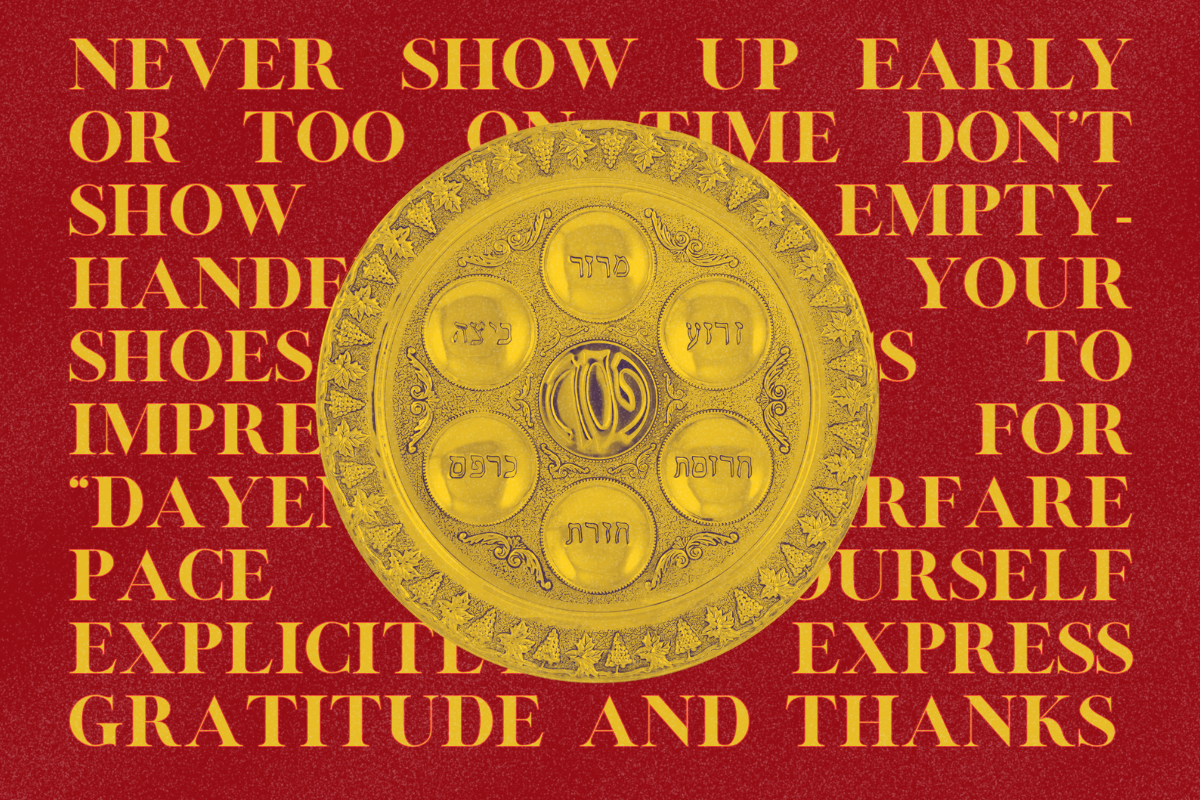
“Growing up in an American home as a Persian Jew, there’s Farsi phrase that sticks out to me: ‘Daste shomâ dard nakone,’ which quite literally translates to ‘may your hand not hurt.’ In other words, it’s a way of saying thank you to someone when you want to acknowledge their hard work. To me, it is the essence of hosting culture — something that has been ingrained in me since childhood.
Whether I was going to Shabbat at my grandparents’ house or helping my mom set up for Thanksgiving, I have attended my fair share of dinner parties. For the uninitiated: Hosting is huge in Persian culture and can be used as a barometer of respect. One may be deeply judged for how well they set up and their ability to host.”
* * *
Sophie Bravo on why we need to keep singing the Holocaust survivors’ anthem:
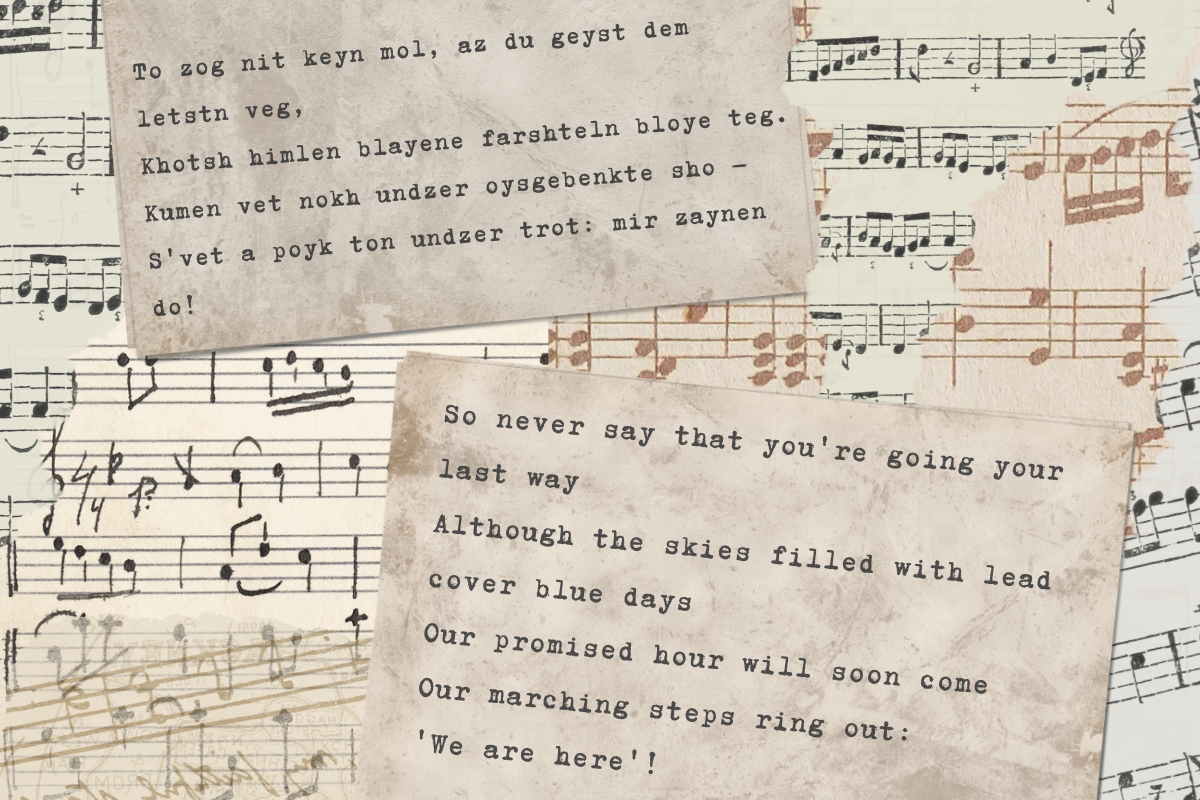
“‘Zog Nit Keyn Mol’ is not simply an old Yiddish song, it is the Holocaust survivors’ anthem. It was a poem written by Lithuanian teenager Hirsch Glick while living in the Vilna Ghetto in 1943. He set it to music by Russian composer Dmitry Pokrass and it quickly spread throughout Europe to different camps, ghettos and partisan communities. In an interview with Dolph Klainberg as part of the Yiddish Book Center’s Oral History Project, he roughly translates and shares the meaning of the song: “Never say that the skies are leaded. The hour will come when our steps will be heard that we are here.” Its message of hope, not giving up and holding out for a better future have become the song of Holocaust survivors, their descendants and the Jewish community.”
* * *
Diana Dalton‘s love letter to her mother, a Hebrew school and Sunday school dropout:
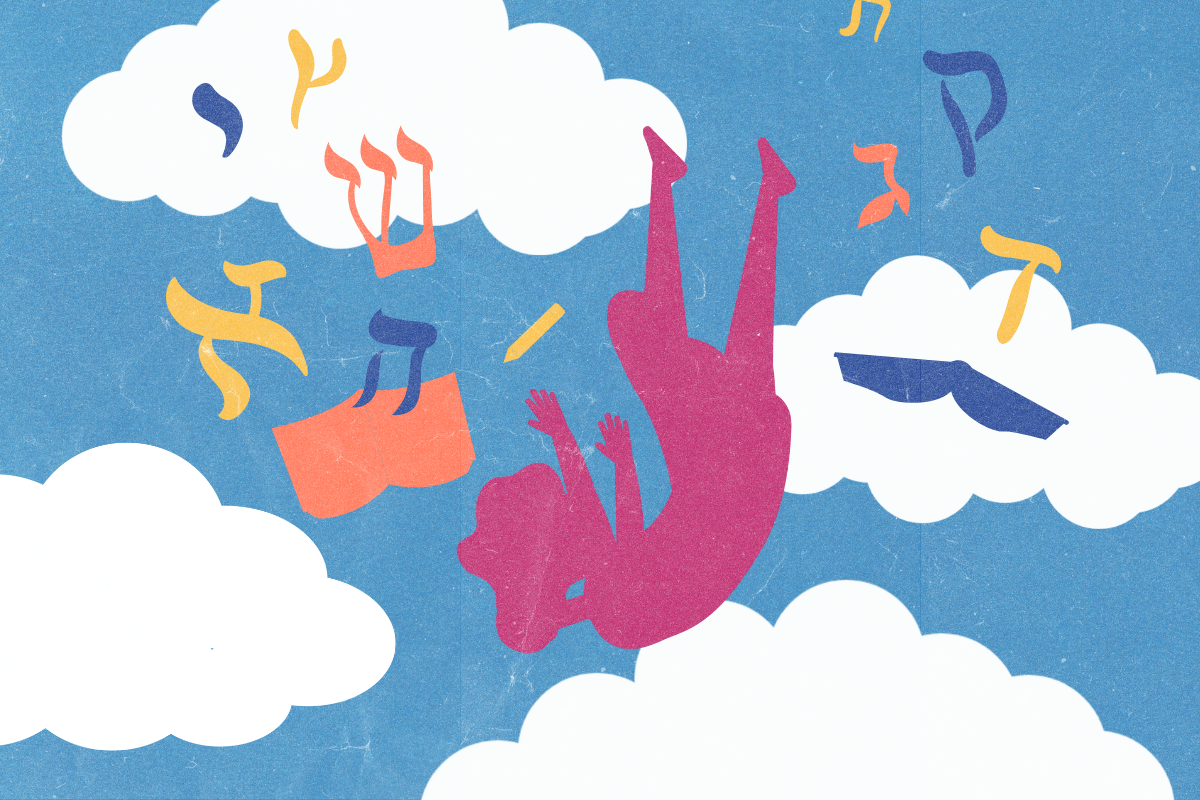
“My mother may not be a bat mitzvah, but she considers the rebelliousness that kept her from the bimah to be her strength — and so do I. Her independent thinking and chutzpah should be seen as an honor to the religion she divorced at 6. Like the Jewish matriarchs before her, she strives to live her life through the universal practices of equity, courage and respect — and the examples she sets inspire me to do the same.”
* * *
Hannah Davis on why we need Jewish joy now more than ever:
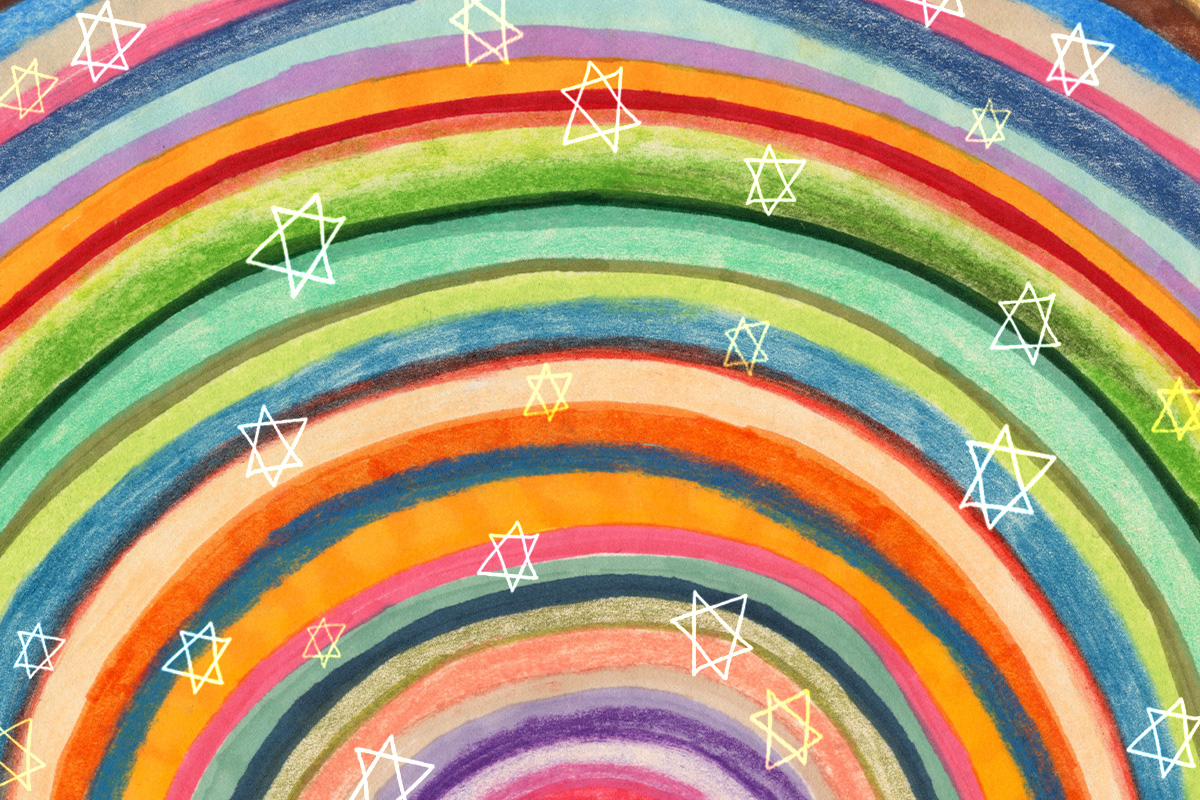
“We, as Jewish people, are a legacy of escape, displacement and survival. We have carried our culture through every battle. We have whispered our history to one another across centuries and continents. Our wisdom has traveled like a message in a bottle, wrapped up and hidden and stowed away in the hopes that it reaches the right people when they need it most. We have moved secretly and silently through fear and darkness. We have made ourselves smaller and harder to find, and we have rebuilt it all from nothing.
One day we will shout not in terror, but in jubilation. We will feel free and we will be happy. Windows and doors will be open and sunlight will shine through, and we will move boldly, unashamedly. We will hold each other more for love than for safety. We will not have to check over our shoulders and count our blessings because we will have forgotten, just a little bit, what it is to be so scared. And unabashed Jewish joy will be ours — steadily and unchangingly ours.”
* * *
Victoria Dozer‘s essay about returning to Poland, where her grandfather endured the Holocaust:

“Though my grandfather was imprisoned at Auschwitz and Mauthausen, I was overcome with emotion a few times while touring Majdanek. While I won’t delve into the details for fear of being too graphic, the suffering was in the air. After placing a stone in front of the gas chambers to honor the victims of Majdanek, I took a rock, too. I felt the need to take back the land. Just a little land, a little portion of the camps that could be controlled by a Jew. I plan to place the rock — in addition to rocks from the Szydłowiec Jewish Cemetery — on my grandfather’s grave, to give him back a bit of the homeland taken from him.”
* * *
Cecilia Edelberg‘s profile of Argentinean Jew Andrés Cantor, the voice of the World Cup:

“I searched to see if there were any Jewish players participating [in the World Cup] (as one does). While I was disappointed to find that there are not many Jewish players, I discovered that the voice that had given me that warm feeling belonged to Argentinean Jew Andrés Cantor. Knowing that he was Jewish inexplicably filled me with joy. There are really not that many of us in the U.S.; only about 4% of the Jewish population identifies as Hispanic. Being a Hispanic Jew in America means answering lots of questions about my identity. Jewish people and Hispanics alike often do not understand how someone can be both — even though Argentina has the seventh-largest Jewish population in the world.
In my excitement of finding a famous Argentinean Jew, I kept reading and researching Cantor, and I realized that he is a very big deal. While you might not know what Cantor looks like, you would without a doubt recognize his voice. He is the one that popularized the long “goooooal” announcement in the U.S. Since then, he has won five Emmys and been featured as a character in “The Simpsons.” His play-by-play is iconic, and his on-air analysis is unparalleled. Cantor’s vivid narration and love for the sport set him apart in the U.S. where soccer was just starting to become popular.”
* * *
Karly Jacklin on losing her brother and Judaism’s ambiguous approach to the afterlife:
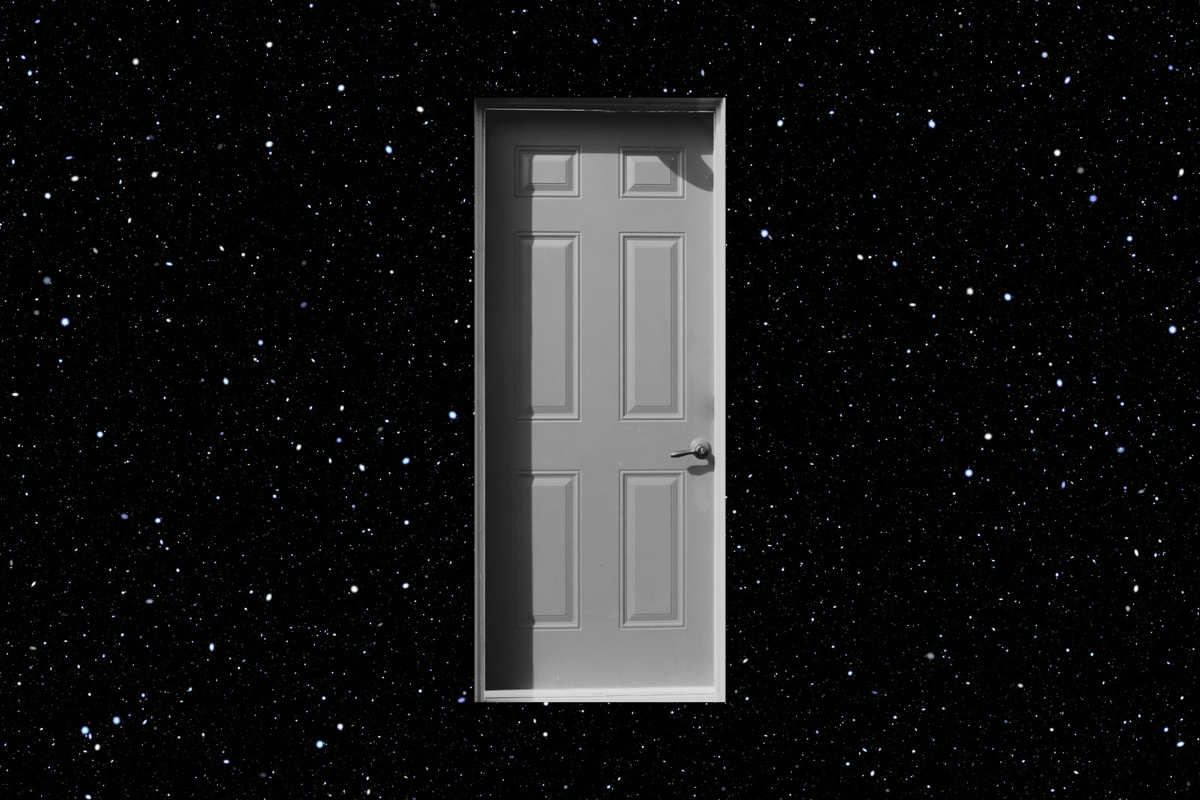
“The ambiguity of the afterlife in Judaism was something that I had previously appreciated with an ironic certainty. It was good, and only good, that we can’t really piece together what exactly follows death. I was content with only knowing the outline of life after death, thinking that the presence of any confirmed details might inspire feelings of existential dread that I was not prepared to address. Now that I find myself facing the aftermath of an ‘out-of-order’ death, my feelings have evolved beyond a staunch love toward uncertainty and into something far more complicated. These days, I’m frustrated with the open-endedness of the Jewish afterlife. I often find myself longing for just a glimpse through the window to whatever happens next, wondering if having just a little more clarity about the whereabouts of my brother would lessen the pain of losing him.”
* * *
Miya Libman on their Korean Jewish identity and kimchi latkes:

“Holding space for both my Korean and my Jewish identities in one breath has never been easy for me. I always feel like I’m toeing a line, being perceived as Jewish in one space and then as Korean in the next (or more likely just… confusing people). As the world around me has tried to categorize me as one or the other, my identity has started to feel cyclical, always Korean or Jewish — never both.
As I’ve searched for connections to both parts of my Jewish and Korean identity, food has always been a strong cultural link.”
* * *
Maya Mehrara‘s guide on how to celebrate a Persian Jewish Passover seder:
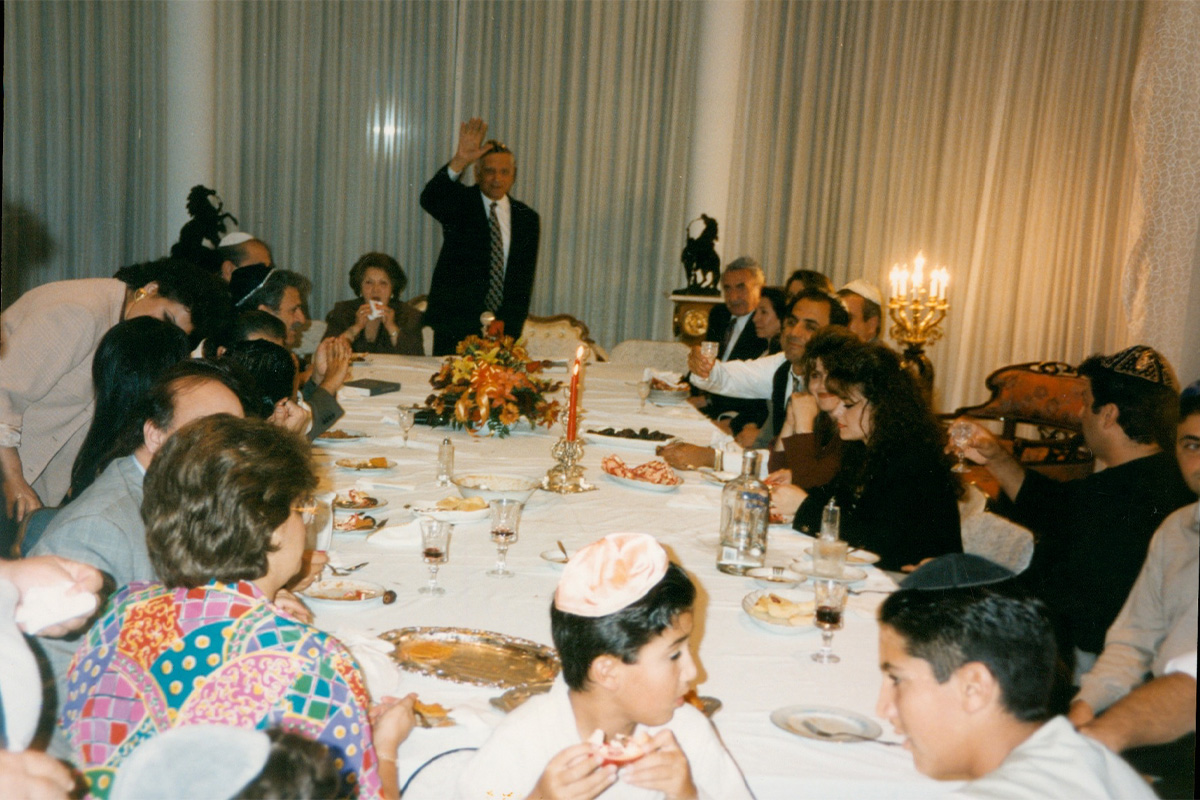
“Picture this: after spending two and a half hours stuck in Long Island traffic, you arrive in Great Neck. You enter through the grand doorway into a Persian explosion — the living room bursting with laughter, a mish-mosh of English and Farsi, and smells strong enough to make you salivate almost instantly. People stand around munching on cucumbers and gondi (chicken and vegetable meatballs), talking animatedly. Hugs and never-ending cheek-to-cheek kisses envelop you. When it’s time, my grandmother urges people to enter the formal living room, where a large T-shaped table is set up with places for at least 50 people. My late grandfather, whom we lovingly called Babajoon, would take his iconic seat at the head of the table with my cousins and me sitting by his side, and the service would commence.”
* * *
Benyamin Rumi‘s analysis of the Jewish poem that helped him grieve his grandfather:
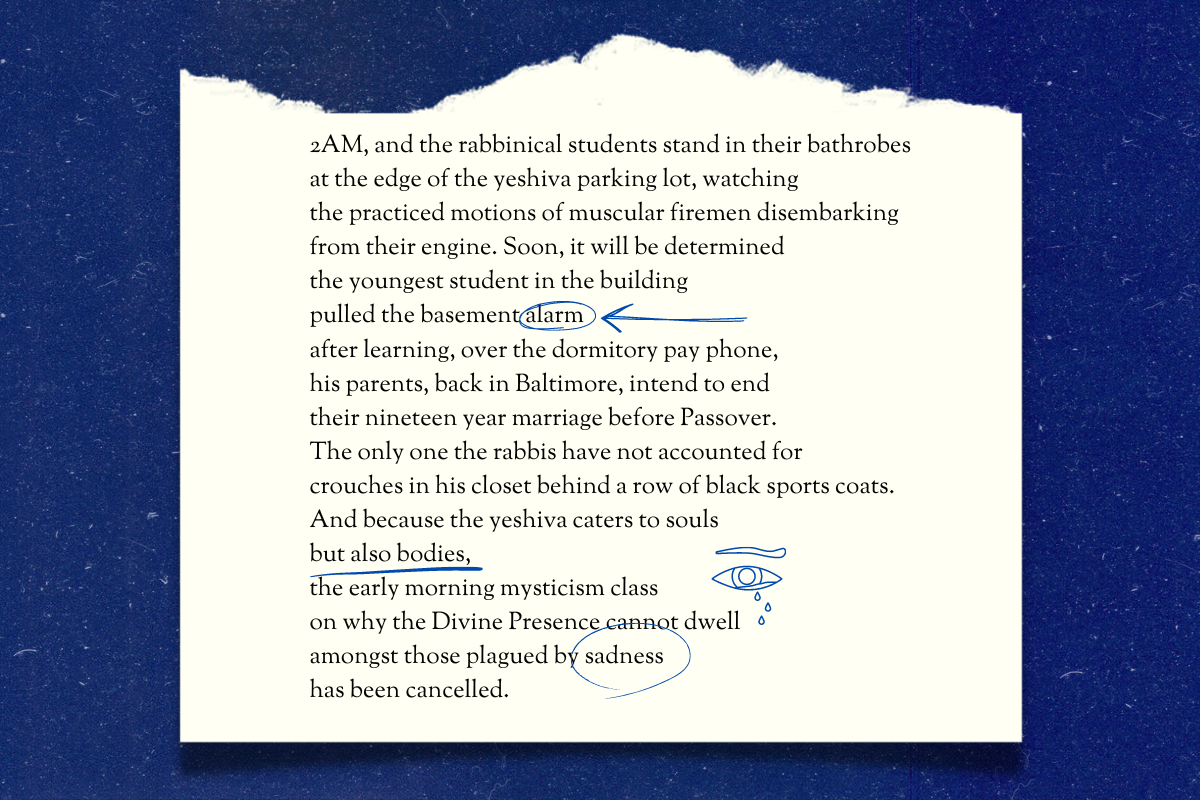
“I first heard Yehoshua November’s poem, ‘2AM, and the Rabbinical Students Stand in Their Bathrobes’ in January 2022 — by then well on my way through my Jewish conversion — on the Poetry Unbound podcast. The title’s explicitly Jewish reference had intrigued me, but it was upon reaching the fourth line that the magnitude of the poem truly struck me:
[…]Soon, it will be determined
the youngest student in the building
pulled the basement alarm
after learning, over the dormitory pay phone
his parents, back in Baltimore, intend to end
their nineteen year marriage before Passover.
I felt like November had stood in my room, held a mirror up to me and asked, ‘Have you pulled your alarm?'”
* * *
Sheldon Skoboloff‘s reminder that Jews speak Spanish and Portuguese too:
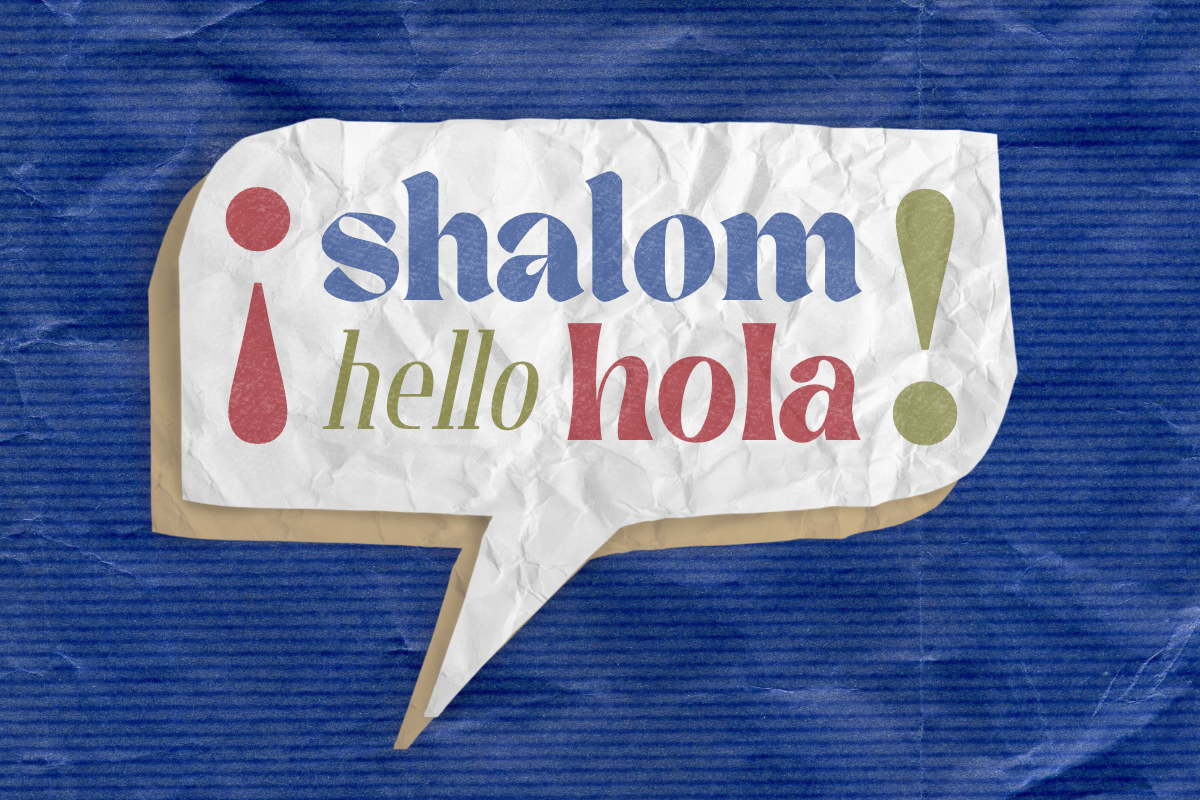
“English is not the de facto language of Judaism. In fact, Judaism does not have a de facto language, as the Talmud states that a Jew may pray in whatever language they understand. Comments like the ones I received ignore Judaism’s rich Spanish and Portuguese history. Though their lives weren’t always easy, Jews have lived on the Iberian peninsula since at least 250 BCE, meaning the Jewish people have been interacting with Spanish and Portuguese for over 2000 years — not to mention the existence of languages like Ladino, also known as Judeo-Espanyol, which can be understood as a Spanish parallel to Yiddish and is recognized as a minority language in Israel, France, Turkey and Bosnia and Herzegovina. The Jews of the Iberian peninsula have made many great contributions to our culture, from culinary pleasures like buñuelos eaten on Hanukkah to Moses de Leon, the Spanish rabbi who first published the Zohar. Jews who converse in Spanish and Portuguese have always been an integral part of our diaspora.”
* * *
Miri Verona on how Regina Spektor inspires her to be a complicated Jewish woman:

“I’m still figuring out what it means to me to be a Jewish woman. Here, I can turn to Regina for guidance. While her music often has a surreal lack of clarity, she always wears her Jewish identity on her sleeve. Whether she’s spitting facts about antisemitism with dazzling wit or just being a silly ray of Jewish joy, she’s my favorite wielder of Jewish pride.”
* * *
SJ Waring‘s thoughts on how to deal with Jewish imposter syndrome:
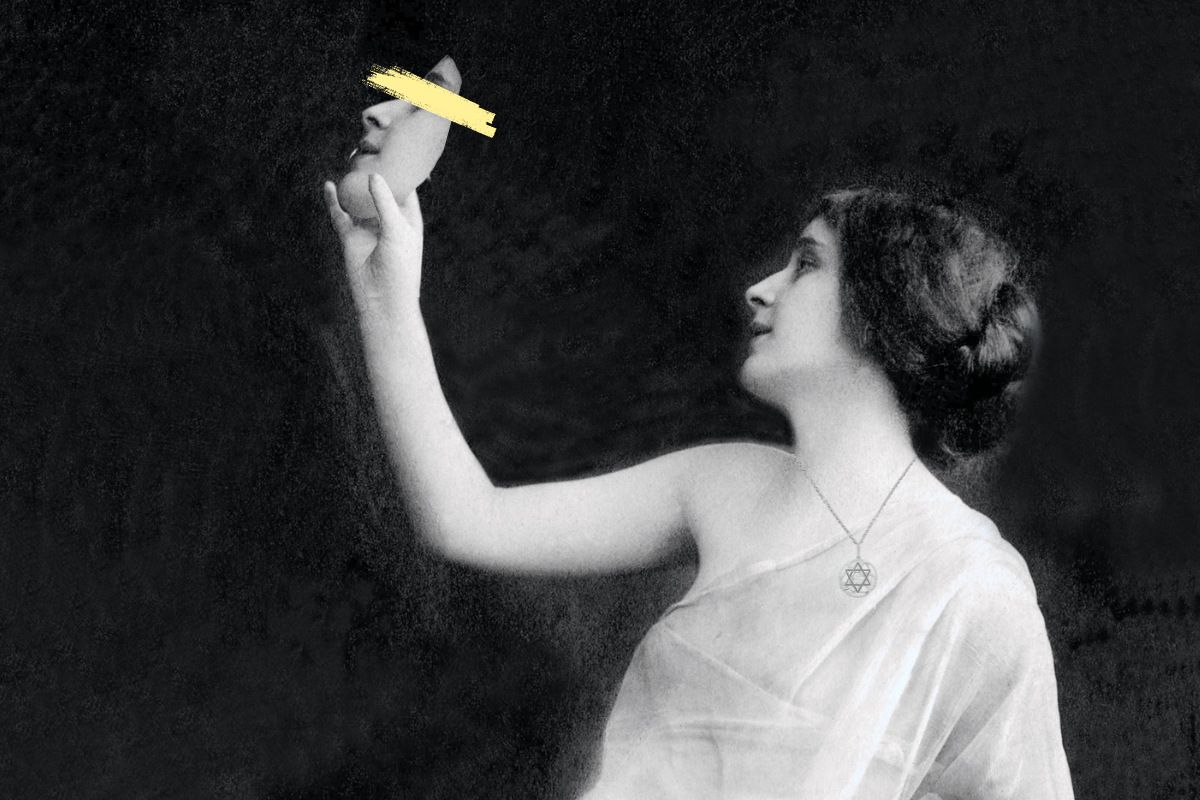
“To everyone else who deals with Jewish imposter syndrome, you are not an imposter. No matter your relationship with Judaism, you are still Jewish, and you still belong. I’m proud of you, too.”
* * *
Mazel tov to the 2022-2023 Hey Alma college writing fellows!
